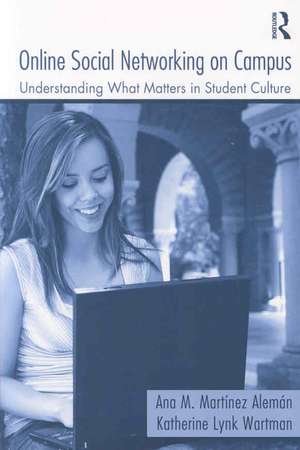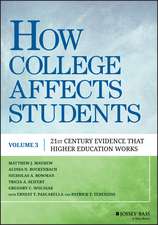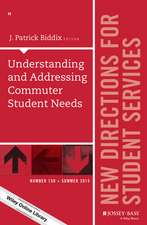Online Social Networking on Campus: Understanding What Matters in Student Culture
Autor Ana M. Martínez-Alemán, Katherine Lynk Wartmanen Limba Engleză Paperback – 24 noi 2008
| Toate formatele și edițiile | Preț | Express |
|---|---|---|
| Paperback (1) | 476.30 lei 6-8 săpt. | |
| Taylor & Francis – 24 noi 2008 | 476.30 lei 6-8 săpt. | |
| Hardback (1) | 1273.15 lei 6-8 săpt. | |
| Taylor & Francis – 24 noi 2008 | 1273.15 lei 6-8 săpt. |
Preț: 476.30 lei
Nou
Puncte Express: 714
Preț estimativ în valută:
91.14€ • 95.16$ • 75.43£
91.14€ • 95.16$ • 75.43£
Carte tipărită la comandă
Livrare economică 04-18 aprilie
Preluare comenzi: 021 569.72.76
Specificații
ISBN-13: 9780415990202
ISBN-10: 0415990203
Pagini: 168
Ilustrații: 10 line drawings
Dimensiuni: 152 x 229 x 10 mm
Greutate: 0.31 kg
Ediția:New.
Editura: Taylor & Francis
Colecția Routledge
Locul publicării:Oxford, United Kingdom
ISBN-10: 0415990203
Pagini: 168
Ilustrații: 10 line drawings
Dimensiuni: 152 x 229 x 10 mm
Greutate: 0.31 kg
Ediția:New.
Editura: Taylor & Francis
Colecția Routledge
Locul publicării:Oxford, United Kingdom
Cuprins
Preface
Chapter 1 Introduction: Campus Life Online
Chapter 2 Emergence and Acceleration: Computer-Mediated Communication and the College Student
Glossary
Index
Author Biographies
Chapter 1 Introduction: Campus Life Online
Chapter 2 Emergence and Acceleration: Computer-Mediated Communication and the College Student
- The rise of the technological generation and the construction of individual identity and college culture
- Internet history and use
- Development of online social networking sites
- Social networking sites as cultural phenomenon: Generally and on campus
- College Student Identity: Issues and research on online social networking sites
- Facebook Primer
- What Students Report about Their Facebook Use
- Student Portraits
- Kris
- Jordan
- Teresa
- Matthew
- Our Observations
- Do Administrators Belong on Facebook?
- Student Leaders as Cultural Translators
- Orienting Students to Campus Culture, both Real and Online
- Supporting Student Development in the Expanding Campus Community
- What is the future of online social networking on campus?
- Changing demographic of Facebook and Online Social Networks
- Global Growth
- New Niche Users
- Post Script
Glossary
Index
Author Biographies
Notă biografică
Ana M. Martínez Alemán is Associate Professor of Education and Chair of the Department of Educational Administration and Higher Education at the Lynch School of Education, Boston College. Her work has appeared in the Journal of Higher Education, the Review of Higher Education, Educational Theory, and Teachers College Record, and other scholarly journals. She has contributed to Women in Academe: The Unfinished Agenda (2008), Gendered Futures in Higher Education: Critical Perspectives for Change (2003) and Feminist Interpretations of John Dewey (2002). She is the co-author (with Kristen A. Renn) of Women in Higher Education: An Encyclopedia (2002).
Katherine Lynk Wartman is a PhD candidate at Boston College where her research interests include college student culture, the first-year experience, college access, and the parent-student relationship. She is also a resident director at Simmons College in Boston, MA and has served as Parent and Family Relations and Special Projects Administrator at Colby-Sawyer College. She is the co-author (with Marjorie B. Savage) of Parental Involvement in Higher Education; Understanding the Relationship among Students, Parents, and the Institution (2008), a volume in the Association for the Study of Higher Education (ASHE) Higher Education Report Series.
Katherine Lynk Wartman is a PhD candidate at Boston College where her research interests include college student culture, the first-year experience, college access, and the parent-student relationship. She is also a resident director at Simmons College in Boston, MA and has served as Parent and Family Relations and Special Projects Administrator at Colby-Sawyer College. She is the co-author (with Marjorie B. Savage) of Parental Involvement in Higher Education; Understanding the Relationship among Students, Parents, and the Institution (2008), a volume in the Association for the Study of Higher Education (ASHE) Higher Education Report Series.
Recenzii
"An enlightening and challenging look at the ways in which students use social networking online to explore their individual and collective identities…Online Social Networking on Campus would be a wonderful text for a graduate seminar on contemporary issues in college student development or student affairs. The book would serve equally well as the centerpiece of a professional development reading group discussion. The authors are to be congratulated on their thoughtful and thought-provoking work, and you are encouraged to get involved in the conversation through picking up a copy of this book soon."--George S. McClellan, Journal of College Student Development, July/August 2009, Vol 50 No 4, 468-469
"This book will be useful for anyone with a specific interest in university students and their use of Facebook, or as an example of how to conduct a study of this nature". - Learning, Media and Technology, 35:1
"This book is one means of becoming more educated about the many ways in which students, and even administrators, can take advantage of Facebook to enhance the college student experience. It also provides a good resource for those who are unfamiliar with Facebook and the culture created online through this somewhat new and developing technology."—Review of Higher Education
Martin Weller: The Open University, UK (Areas of speciality: Ed Technology, e-learning, web 2.0)
"The main appeal is that there isn’t an academic book available that addresses this issue. So there is a gap in the market and it is an area of very rich social interaction and significance."
"the book would be of great interest in the UK. Since doing the review, Facebook has really taken off. I agree with your analysis of what would be of what would be appealing to readers ( Key UK selling points), and I would add also that the technical aspect of how other applications plug in to Facebook would be interesting. Their decision to open up their platform to allow other tools to plug in has been key in the massive growth of FB. Indeed many of us are now discussing whether FB should become the VLE for many institutions, ie we go out to where the students are, rather than them coming to us."
Kristen Renn:Michigan State University (Areas of speciality: Higher Education, College Student Development, Student Identity, peer cultures, race gender and sexuality in higher education)
"There is a great degree of interest in student affairs about this topic – the recent ACPA/NASPA Joint Meeting featured a number of sessions on Facebook and its impact on campus"...I would encourage colleagues teaching courses about educational technology, student affairs administration, and college environments to adopt the book for their courses."
Estela Mara Bensimon: University of Southern California (areas of speciality Administration of HE)
"I AM NOT TEACHING SUCH A COURSE BUT IF I WAS I CERTAINLY WOULD CONSIDER ALEMAN’S PUBLICATIONS, PRIMARILY BECAUSE SHE HAS A STRONGER THEORETICAL ORIENTATION THAN IS TYPICAL OF STUDENT DEVELOPMENT WORK. SHE IS VERY THOUGHTFUL AND CREATIVE".
"This book will be useful for anyone with a specific interest in university students and their use of Facebook, or as an example of how to conduct a study of this nature". - Learning, Media and Technology, 35:1
"This book is one means of becoming more educated about the many ways in which students, and even administrators, can take advantage of Facebook to enhance the college student experience. It also provides a good resource for those who are unfamiliar with Facebook and the culture created online through this somewhat new and developing technology."—Review of Higher Education
Martin Weller: The Open University, UK (Areas of speciality: Ed Technology, e-learning, web 2.0)
"The main appeal is that there isn’t an academic book available that addresses this issue. So there is a gap in the market and it is an area of very rich social interaction and significance."
"the book would be of great interest in the UK. Since doing the review, Facebook has really taken off. I agree with your analysis of what would be of what would be appealing to readers ( Key UK selling points), and I would add also that the technical aspect of how other applications plug in to Facebook would be interesting. Their decision to open up their platform to allow other tools to plug in has been key in the massive growth of FB. Indeed many of us are now discussing whether FB should become the VLE for many institutions, ie we go out to where the students are, rather than them coming to us."
Kristen Renn:Michigan State University (Areas of speciality: Higher Education, College Student Development, Student Identity, peer cultures, race gender and sexuality in higher education)
"There is a great degree of interest in student affairs about this topic – the recent ACPA/NASPA Joint Meeting featured a number of sessions on Facebook and its impact on campus"...I would encourage colleagues teaching courses about educational technology, student affairs administration, and college environments to adopt the book for their courses."
Estela Mara Bensimon: University of Southern California (areas of speciality Administration of HE)
"I AM NOT TEACHING SUCH A COURSE BUT IF I WAS I CERTAINLY WOULD CONSIDER ALEMAN’S PUBLICATIONS, PRIMARILY BECAUSE SHE HAS A STRONGER THEORETICAL ORIENTATION THAN IS TYPICAL OF STUDENT DEVELOPMENT WORK. SHE IS VERY THOUGHTFUL AND CREATIVE".
Descriere
This is a professional guide for Higher Education faculty and Student Affairs administrators, which rigorously examines college students’ use of online social networking sites and how they use these to develop relationships both on and off campus. Most importantly, it investigates how college students use online sites to explore and makes sense of their identities. Providing information taken from interviews, surveys and focus group data, the book presents an ethnographic view of social networking that will help Student Affairs administrators, Information Technology administrators, and faculty better understand and provide guidance to the "neomillennials" on their campuses.















